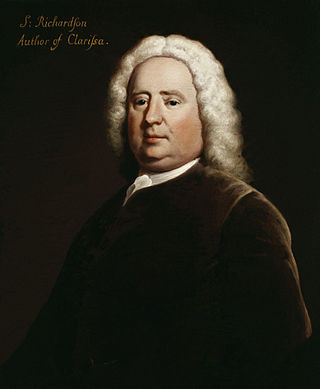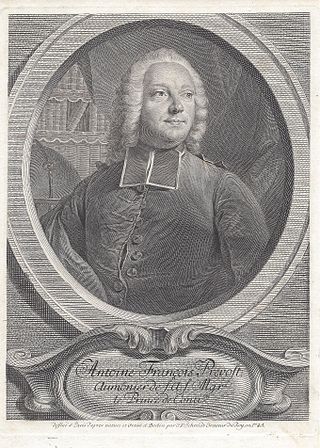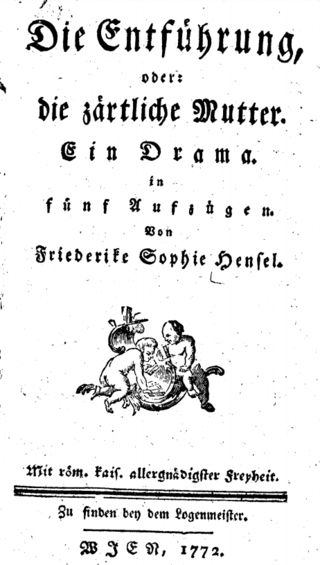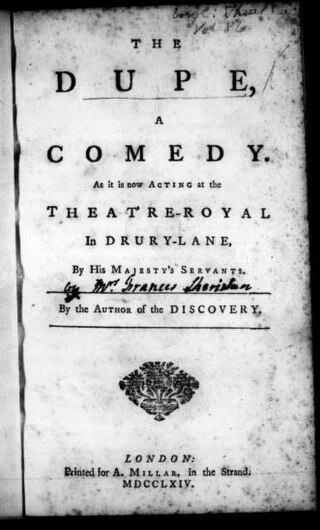
Samuel Richardson was an English writer and printer known for three epistolary novels: Pamela; or, Virtue Rewarded (1740), Clarissa: Or the History of a Young Lady (1748) and The History of Sir Charles Grandison (1753). He printed almost 500 works, including journals and magazines, working periodically with the London bookseller Andrew Millar. Richardson had been apprenticed to a printer, whose daughter he eventually married. He lost her along with their six children, but remarried and had six more children, of whom four daughters reached adulthood, leaving no male heirs to continue the print shop. As it ran down, he wrote his first novel at the age of 51 and joined the admired writers of his day. Leading acquaintances included Samuel Johnson and Sarah Fielding, the physician and Behmenist George Cheyne, and the theologian and writer William Law, whose books he printed. At Law's request, Richardson printed some poems by John Byrom. In literature, he rivalled Henry Fielding; the two responded to each other's literary styles.

Frances Sheridan was an Anglo-Irish novelist and playwright.
This article contains information about the literary events and publications of 1747.
This article contains information about the literary events and publications of 1761.

Antoine François Prévost d'Exiles, usually known simply as the Abbé Prévost, was a French priest, author, and novelist.
Sarah Fielding was an English author and sister of the playwright, novelist and magistrate Henry Fielding. She wrote The Governess, or The Little Female Academy (1749), thought to be the first novel in English aimed expressly at children. Earlier she had success with her novel The Adventures of David Simple (1744).

Clarissa; or, The History of a Young Lady: Comprehending the Most Important Concerns of Private Life. And Particularly Shewing, the Distresses that May Attend the Misconduct Both of Parents and Children, In Relation to Marriage is an epistolary novel by English writer Samuel Richardson, published in 1748. The novel tells the tragic story of a young woman, Clarissa Harlowe, whose quest for virtue is continually thwarted by her family. The Harlowes are a recently wealthy family whose preoccupation with increasing their standing in society leads to obsessive control of their daughter, Clarissa. It is considered one of the longest novels in the English language. It is generally regarded as Richardson's masterpiece.

The History of Sir Charles Grandison, commonly called Sir Charles Grandison, is an epistolary novel by English writer Samuel Richardson first published in February 1753. The book was a response to Henry Fielding's The History of Tom Jones, a Foundling, which parodied the morals presented in Richardson's previous novels. The novel follows the story of Harriet Byron who is pursued by Sir Hargrave Pollexfen. After she rejects Pollexfen, he kidnaps her, and she is only freed when Sir Charles Grandison comes to her rescue. After his appearance, the novel focuses on his history and life, and he becomes its central figure.

Sensibility refers to an acute perception of or responsiveness toward something, such as the emotions of another. This concept emerged in eighteenth-century Britain, and was closely associated with studies of sense perception as the means through which knowledge is gathered. It also became associated with sentimental moral philosophy.
The sentimental novel or the novel of sensibility is an 18th- and 19th-century literary genre which presents and celebrates the concepts of sentiment, sentimentalism, and sensibility. Sentimentalism, which is to be distinguished from sensibility, was a fashion in both poetry and prose fiction beginning in the eighteenth century in reaction to the rationalism of the Augustan Age.
Literature of the 18th century refers to world literature produced during the years 1700–1799.

Laetitia Pilkington was an Anglo-Irish poet. She is known for her Memoirs which document much of what is known about Jonathan Swift.
The academic discipline of women's writing is a discrete area of literary studies which is based on the notion that the experience of women, historically, has been shaped by their sex, and so women writers by definition are a group worthy of separate study: "Their texts emerge from and intervene in conditions usually very different from those which produced most writing by men." It is not a question of the subject matter or political stance of a particular author, but of her sex, i.e. her position as a woman within the literary world.

Memoirs of a Magdalen is a 1767 British novel by the Irish writer Hugh Kelly. Its full title is Memoirs of a Magdalen, or the History of Louisa Mildmay.

Friederike Sophie Seyler was a German actress, playwright and librettist. Alongside Friederike Caroline Neuber, she was widely considered Germany's greatest actress of the 18th century; Gotthold Ephraim Lessing described her in his Hamburg Dramaturgy as "incontestably one of the best actresses that German theatre has ever seen."
Sophia Briscoe was an English author of two epistolary novels. Little is known of her life.
Elizabeth, Lady Echlin was an English writer, best known for her correspondence with Samuel Richardson, and for writing an alternative and less shocking ending to his novel Clarissa.

Die Entführung, oder: die zärtliche Mutter is a play in five acts by Friederike Sophie Seyler. It was originally published in 1770 under the title Die Familie auf dem Lande and then in a revised version under the new title in 1772. It is one of few 18th century plays written by a female playwright. The play was a dramatic adaptation of the 1767 novel Conclusion of the Memoirs of Miss Sidney Bidulph (1767) by Frances Sheridan, that was a sequel to her earlier novel Memoirs of Miss Sidney Bidulph. The latter novel was itself inspired by Pamela; or, Virtue Rewarded by Samuel Richardson. The play is written in the style of a comédie larmoyante, popular with female playwrights, where a happy ending follows a tragic narrative.

Mothers of the Novel: 100 Good Women Writers Before Jane Austen (1986), by Dale Spender, is a foundational study for the reclamation project central to feminist literary studies in English in the late 1980s and 1990s.

The Dupe is a 1763 comedy play by the Irish writer Frances Sheridan. It premiered at the Theatre Royal, Drury Lane in London on 10 December 1763. The original cast included Richard Yates as Sir John Woodall, William Havard as Friendly, John Hayman Packer as Wellford, Thomas King as Sharply and Hannah Pritchard as Mrs Etherdown, Kitty Clive as Mrs Friendly. It was one of only two new mainpieces debuting at Drury Lane that year along with a clutch of afterpieces. Sheridan, the mother of the playwright Richard Brinsley Sheridan, was best known for her novel Memoirs of Miss Sidney Bidulph but had enjoyed success with the play The Discovery earlier in the year.












